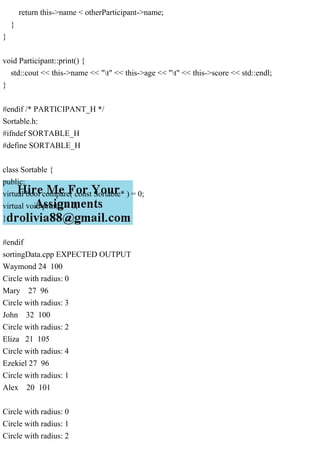Make all of your classes work correctly with sortingData.cpp. Note t.pdf
- 1. Make all of your classes work correctly with sortingData.cpp. Note that sortingData.cpp creates a mixture of both Circles and Participants; this means that your compare methods cannot assume they can always simply downcast Sortable pointers to their own type. You will have to use dynamic_casts and/or the typeid function to check what kind of object the compare method receives and act accordingly. When comparing two objects of the same type, use the same logic as in lab 8. But when asked to compare a Circle with a Participant or vice-versa, by definition we will consider a Circle < Participant, so that, after sorting, all Circles should show up in the Data vector before all of the Participants. (See the expected output below.) Modify Circle.h and Participant.h classes. All 5 files are provided, you only need to modify Circle.h and Participant.h and make sure they work correctly with sortingData.cpp. sortingData.cpp: #include #include #include "Data.h" #include "Circle.h" #include "Participant.h" using namespace std; int main( int argc, const char* argv[] ) { Data myData; myData.add( new Participant( "Waymond", 24, 100 ) ); myData.add( new Circle() ); myData.add( new Participant( "Mary", 27, 96 ) ); myData.add( new Circle( 3 ) ); myData.add( new Participant( "John", 32, 100 ) ); myData.add( new Circle( 2 ) ); myData.add( new Participant( "Eliza", 21, 105 ) ); myData.add( new Circle( 4 ) ); myData.add( new Participant( "Ezekiel", 27, 96 ) );
- 2. myData.add( new Circle( 1 ) ); myData.add( new Participant( "Alex", 20, 101 ) ); myData.print(); myData.sort(); myData.print(); return 0; } Data.h: #ifndef DATA_H #define DATA_H #include #include #include class Data { private: std::vector dataset; public: void add(int number); void sort(); void print(); }; void Data::add(int number) { dataset.push_back(number); } void Data::sort() { std::sort(dataset.begin(), dataset.end()); }
- 3. void Data::print() { for (auto element : dataset) { std::cout << element << " "; } std::cout << std::endl; } #endif /* DATA_H */ Circle.h: #ifndef CIRCLE_H #define CIRCLE_H #include "Sortable.h" class Circle : public Sortable { private: float radius; public: Circle(); Circle(float r); bool compare(const Sortable* other) override; void print() override; }; Circle::Circle() : radius(0.0f) {} Circle::Circle(float r) : radius(r) {} bool Circle::compare(const Sortable* other) { const Circle* circle = dynamic_cast(other); if (circle) { return radius < circle->radius; } return false; } void Circle::print() { std::cout << "Circle with radius: " << radius << std::endl;
- 4. } #endif /* CIRCLE_H */ Participant.h: #ifndef PARTICIPANT_H #define PARTICIPANT_H #include #include "Sortable.h" class Participant : public Sortable { private: std::string name; int age; double score; public: Participant(std::string name, int age, double score); bool compare(const Sortable* obj) override; void print() override; }; Participant::Participant(std::string name, int age, double score) { this->name = name; this->age = age; this->score = score; } bool Participant::compare(const Sortable* obj) { const Participant* otherParticipant = dynamic_cast(obj); if (this->score != otherParticipant->score) { return this->score > otherParticipant->score; } else if (this->age != otherParticipant->age) { return this->age < otherParticipant->age; } else {
- 5. return this->name < otherParticipant->name; } } void Participant::print() { std::cout << this->name << "t" << this->age << "t" << this->score << std::endl; } #endif /* PARTICIPANT_H */ Sortable.h: #ifndef SORTABLE_H #define SORTABLE_H class Sortable { public: virtual bool compare( const Sortable* ) = 0; virtual void print() = 0; }; #endif sortingData.cpp EXPECTED OUTPUT Waymond 24 100 Circle with radius: 0 Mary 27 96 Circle with radius: 3 John 32 100 Circle with radius: 2 Eliza 21 105 Circle with radius: 4 Ezekiel 27 96 Circle with radius: 1 Alex 20 101 Circle with radius: 0 Circle with radius: 1 Circle with radius: 2
- 6. Circle with radius: 3 Circle with radius: 4 Eliza 21 105 Alex 20 101 Waymond 24 100 John 32 100 Ezekiel 27 96 Mary 27 96
![Make all of your classes work correctly with sortingData.cpp. Note that sortingData.cpp creates a
mixture of both Circles and Participants; this means that your compare methods cannot assume
they can always simply downcast Sortable pointers to their own type. You will have to use
dynamic_casts and/or the typeid function to check what kind of object the compare method
receives and act accordingly.
When comparing two objects of the same type, use the same logic as in lab 8. But when asked to
compare a Circle with a Participant or vice-versa, by definition we will consider a Circle <
Participant, so that, after sorting, all Circles should show up in the Data vector before all of the
Participants. (See the expected output below.) Modify Circle.h and Participant.h classes. All 5
files are provided, you only need to modify Circle.h and Participant.h and make sure they work
correctly with sortingData.cpp.
sortingData.cpp:
#include
#include
#include "Data.h"
#include "Circle.h"
#include "Participant.h"
using namespace std;
int main( int argc, const char* argv[] )
{
Data myData;
myData.add( new Participant( "Waymond", 24, 100 ) );
myData.add( new Circle() );
myData.add( new Participant( "Mary", 27, 96 ) );
myData.add( new Circle( 3 ) );
myData.add( new Participant( "John", 32, 100 ) );
myData.add( new Circle( 2 ) );
myData.add( new Participant( "Eliza", 21, 105 ) );
myData.add( new Circle( 4 ) );
myData.add( new Participant( "Ezekiel", 27, 96 ) );](https://image.slidesharecdn.com/makeallofyourclassesworkcorrectlywithsortingdata-230330210314-fe6b4ff5/85/Make-all-of-your-classes-work-correctly-with-sortingData-cpp-Note-t-pdf-1-320.jpg)




